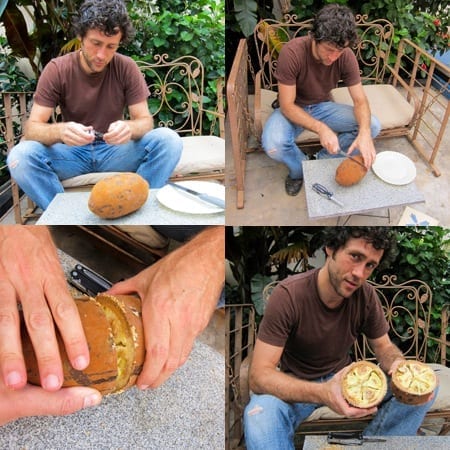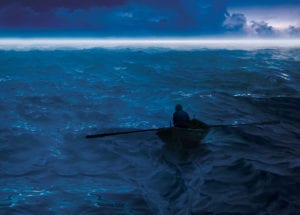By Daniel de la Calle
It is 60 degrees, cloudy and windy at
times and I am listening to the National’s
new record surrounded by maple, oak and pine tress in my office. No
more Tim Maia, Marisa Monte, funky carioca or forró. No more Os
Mutantes. I will need to close my eyes really tight to remember what it
was and felt like 5,000 miles further South, over in Brazil. Right now
Barbara and Sven are on the West Coast receiving their Environmental
Hero Award from NOAA and visiting Elias and his family while back here in NY we received this past week news of three broadcasts on Norwegian national television, NRK (which made Sven particularly happy), and of
the screening at the DOXA Documentary Film Festival in Vancouver. The
Vancouver Observer did a nice little piece about it that you can read here.
The penultimate screening was at the Cineclube Socioambiental Crisantempo in Vila Madalena. Vila Madalena fools you into thinking
that the gigantic city that envelops it does not exist. It is a
beautiful neighborhood with posh restaurants, bars with terraces,
boutiques, artists’ studios, bakeries. If you are rich in Sao Paulo,
you want to hang out around Vila Madalena and forget about the traffic
jams, the hectic Avenida Paulista, the putrid Pinheiros River, the more
than 20 million people around. Crisantempo offers a fantastic space in
which to host film, theatre, dance and music performances. It is all
very well organized and cared for, all extremely professional.
Everybody talks about the city being the engine of South America, more
cosmopolitan, faster paced and wealthier than anywhere else in the
continent and I guess it is true. For me it was a relief to have the
last screenings being a little less stressful and unpredictable. In
preparation for our night the organizers had contacted Leandra Gonçalves
from Greenpeace Brasil to be present during the Q&A. That gave me
the opportunity to not have to listen so much to myself again and learn
some very interesting things about the attempts (or lack thereof) in
Brazil to preserve coastal waters and marine ecosystems. Although I had
already noticed how much meat is eaten everywhere, I was surprised to
know that the average consumption per capita of fish in Brazil barely
reaches 8 kilograms (it is 58 kilograms over in Spain, but we might only
be beat by Japan in our dependency and love for fish). It is a bit of a
paradox that a country so associated with sandy beaches and coconut
groves, surfing, water and nature can literally have its back turned in
another direction if we just look at their national policies and their
diet. Ms Gonçalves was very keen to talk about whales (a symbol for
Greenpeace), so took the opportunity to tell the audience that one of
the possible future lines of research in regards to ocean acidification
and marine life could be the impact a more acidic ocean will have on
animals that communicate through sound underwater. One of the lesser
known facts about acidification is that a decrease of 0.3 in the PH
equals a 40% decrease in the sound absorption coefficient. Yes, there could be
acoustic contamination in the oceans as well.

100 different types of fruit at the
Municipal Market in Sao Paulo.

In a city like Sao Paulo some of the
favelas are vertical. Outside the Municipal Market.
Then it was time to go back to Río, catch a few more waves on Ipanema
beach, watch the city at sunset from Sugar Loaf, buy a kilo of powdered
guaraná and go to the final screening, at the Solar da Imperatriz
in the Jardim Botanico; no less!

The place was also known as Facenda dos Macacos, after the river that
passes through it, but either macaques really liked the name or I want
to believe their profusion had something to do with it as well. They
run up and down electric wires, roll on roofs, feed along the fences,
curious and nervous, mothers carrying several offspring on the backs.
With those curled up tails, hanging at different heights, they looked
like musical notes on a score to the Mata Atlântica.

The somewhat long drive up to this lush location in the outskirts of Rio
did not prevent the screening form going really well. Cecilia Herzog
from Inverde and her husband
Alex (Amigos do Parque)
were in charge of the whole thing and through their hard work, devotion
and energy made sure that it all run smoothly, in a brilliant manner.
The most positive thing about this trip has certainly been meeting
people like them and like Fabiana Duarte de Paula, Eudaldo Guimaraes,
Ana Arruda, Suzana Sattamini, Pedro Cavalcanti, Natalia Ribeiro, Andrea
Palatnik, Luciano Mariz, Gina Boemer or so many other amazing folks that
I am surely forgetting now and have shown to me such conviction and
hope in change, such great generosity and will to help, sharing their
energy and intelligence for this project. They have restored my at
times damaged faith in human kind.
This time at the end we had a panel discussion with journalist Amélia
Gonzales from O Globo and oceanographer David Zee from the University
Veiga de Almeida and the collaboration from members of the audience,
like Trajano Paiva, who runs a website devoted to the oceans called sosoceanos.org.
What a great aftertaste to six fantastic weeks in Brazil. And now for
something completely different.
This post is dedicated to my good friend Miguel
Gil, who helped me throughout the whole trip, shared the laughter, joys
and miseries that come from traveling and just yesterday experienced
the tragedy of his half of the cupuaçu cracking in the dry Granada air.
We will go and get some more, Miguel.



